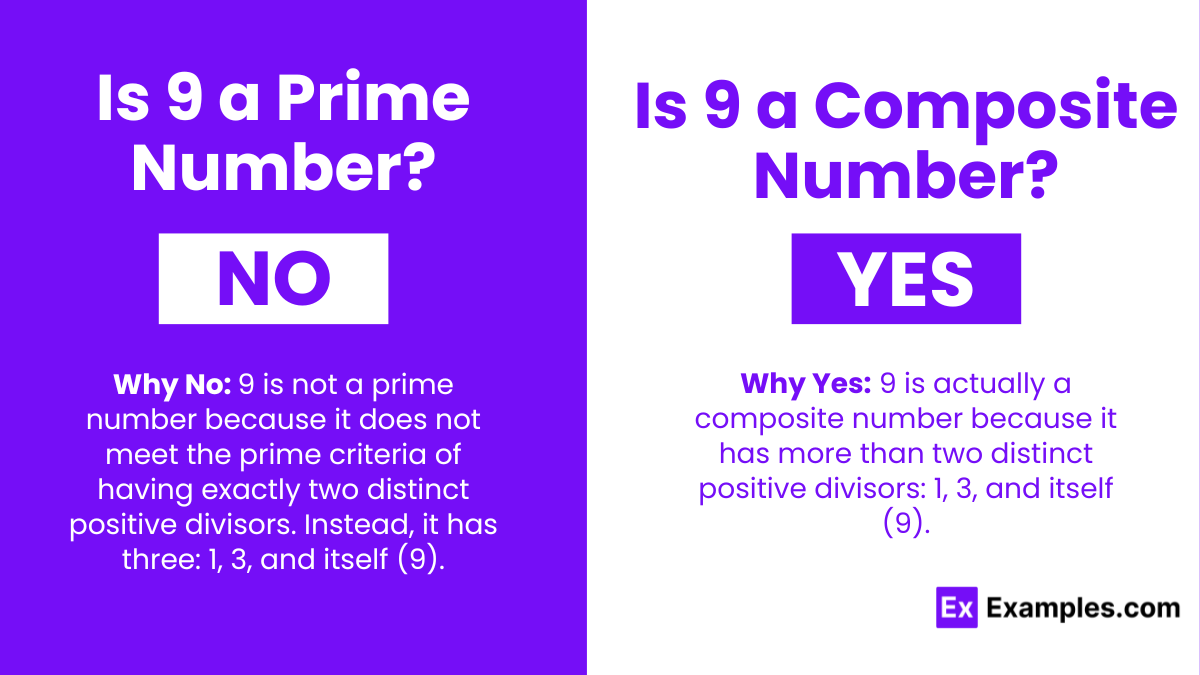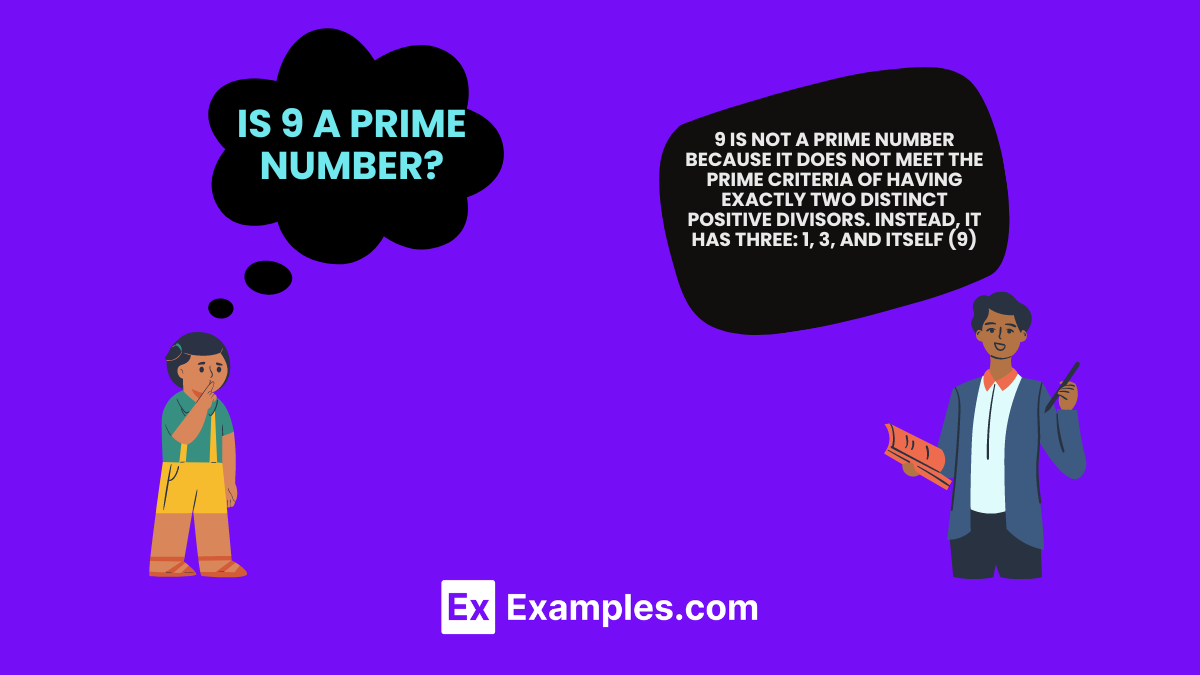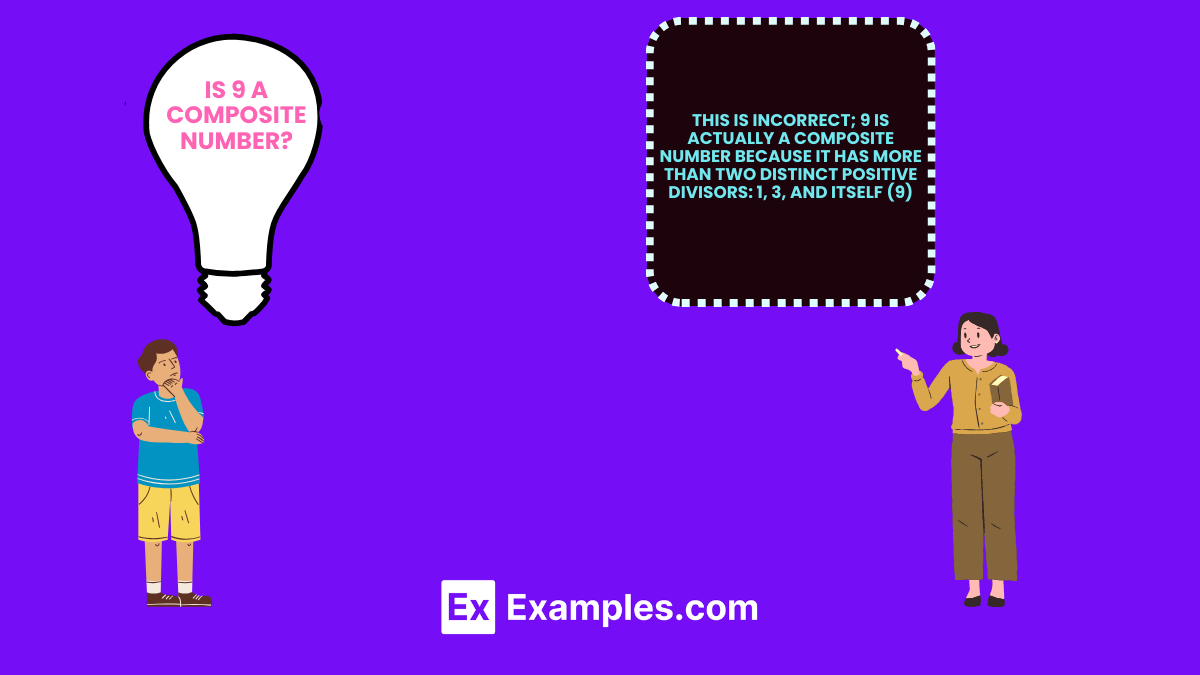Is 9 a prime number or a composite number?
Prime
Composite
Neither
Both


No – 9 is not a prime number.
Why No: 9 is not a prime number because it does not meet the prime criteria of having exactly two distinct positive divisors. Use this Prime number Checker to check for any number.

YES – 9 is a Composite Number
Why Yes: 9 is actually a composite number because it has more than two distinct positive divisors: 1, 3, and itself (9).

| Property | Answer |
|---|---|
| Is 9 a prime number? | No |
| Is 9 a composite number? | Yes |
| Is 9 a perfect square? | Yes |
| Factors of 9 | 1, 3, 9 |
| Multiples of 9 | 9, 18, 27, 36, 45, 54, 63, 72, 81, 90 |
| Cube Root of 9 | 2.08 |
| Square of 9 | 81 |
| Square Root of 9 | 3 |
| Is 9 a Perfect Square? | Yes |
| Is 9 a Perfect Cube? | No |
| Is 9 an Irrational number | No |
| Is 9 a Rational number | Yes |
| Is 9 a Real number | Yes |
| Is 9 an Integer | Yes |
| Is 9 a Natural number | Yes |
| Is 9 a Whole number | Yes |
| Is 9 an Even or odd number | No (9 is an odd number) |
| Is 9 an Ordinal number | Yes |
| Is 9 a Complex number | Yes (as all real numbers are also complex numbers) |
The factors of 9 are 1, 3, and 9. Since 9 is a square number, 3 is its only other factor besides 1 and itself. There are no more factors of 9.
9 is recognized as a composite number because it has more than two divisors, which distinguishes it from prime numbers that are only divisible by 1 and themselves. The number 9, being the square of 3, holds a unique place in mathematics as a perfect square. Additionally, in various cultures around the world, 9 carries symbolic meanings and is often associated with endurance and completion.
The nearest prime numbers to 9 are 7 and 11. 7 is the closest prime number less than 9, and 11 is the closest prime number greater than 9.
No, 9 is not the 9th prime number. It is a composite number because it has divisors other than 1 and itself, specifically 3.
No, 9 is not a prime factor because it is not a prime number. A prime factor must be a prime number, and 9 is divisible by 1, 3, and itself.
Text prompt
Add Tone
10 Examples of Public speaking
20 Examples of Gas lighting
Is 9 a prime number or a composite number?
Prime
Composite
Neither
Both
Which of the following lists all the factors of 9?
1, 2, 3, 9
1, 3, 9
1, 5, 9
1, 3, 6, 9
Which of these numbers is similar to 9 in terms of being a composite number?
2
4
7
11
What makes the number 9 a composite number?
It is even
It has only one divisor
It has more than two divisors
It is a prime number
If 9 were a prime number, how many divisors would it have?
1
2
3
4
If a number is a composite number, how many prime factors can it have?
Only one
Two or more
None
Exactly three
What is the difference between 9 and its smallest prime factor?
6
5
4
3
Which mathematical property helps determine if 9 is a composite number?
It is divisible only by 1 and itself
It can be written as a single prime factor
It has more than two distinct positive divisors
It is a perfect square
Which property confirms that 9 is not a prime number?
It has exactly two distinct positive divisors
It can be expressed as a product of two prime numbers
It has more than two distinct positive divisors
It is a single-digit number
Which of the following statements about the number 9 is correct?
9 is a prime number
9 is a composite number
9 is neither prime nor composite
9 is a prime and composite number
Before you leave, take our quick quiz to enhance your learning!

